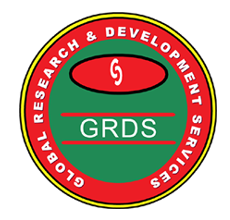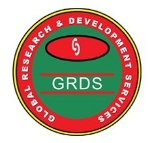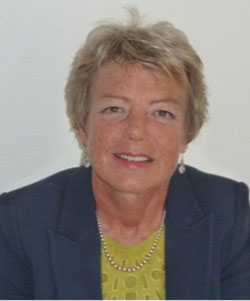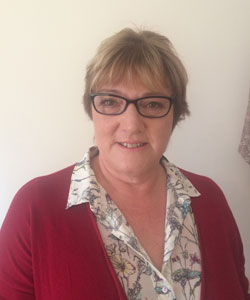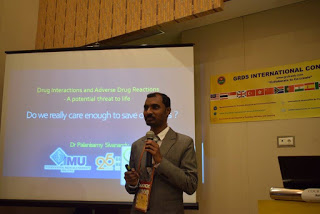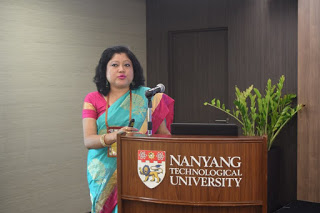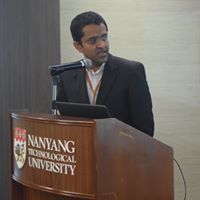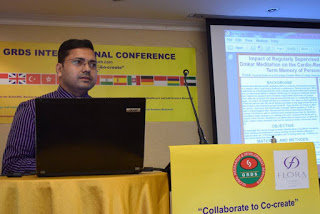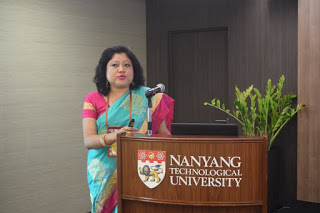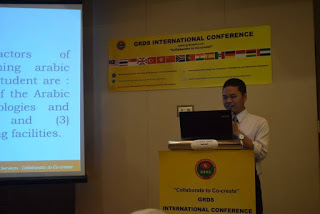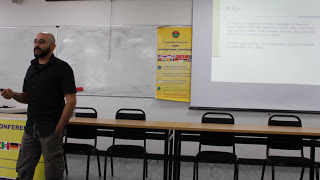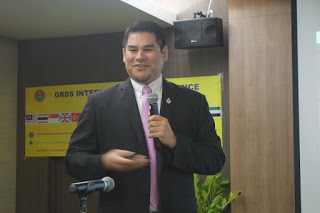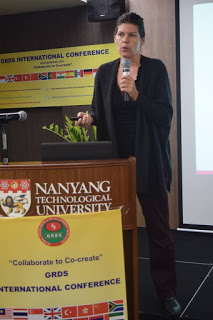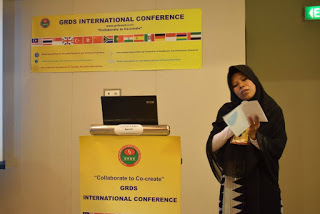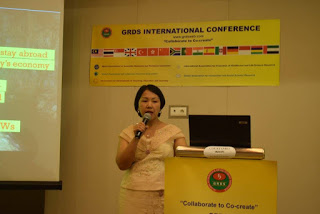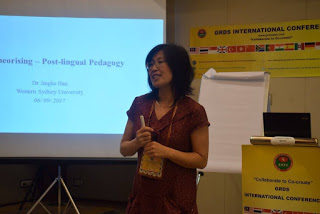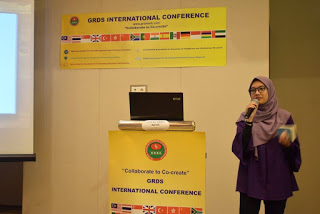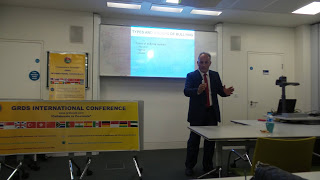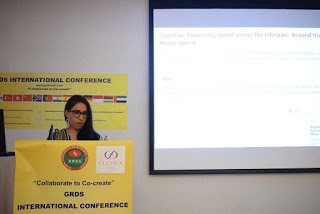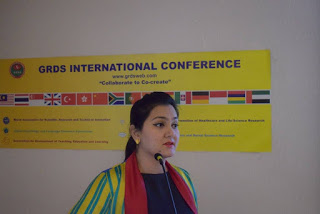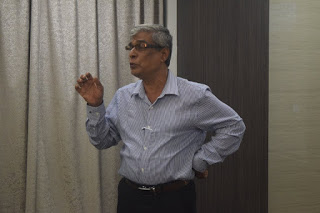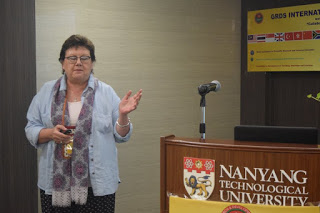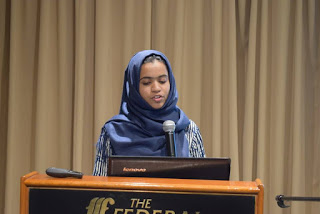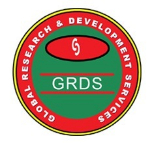Young Research Scholar of GRDS International Conference held at Dubai, Sept 2017
Mohd Faizan Siddiqui
(Aligarh Muslim University, India)
Paper Title: Insight Into The Biochemical, Kinetic And Spectroscopic Characterization Of Garlic (Allium Sativum) Phytocystatin: Implication For Cardiovascular Disease
ABSTRACT: Phytocystatins
are cysteine proteinase inhibitors present in plants. They play crucial role in
maintaining protease-anti protease balance and are involved in various endogenous
processes. Thus, they are suitable and convenient targets for genetic
engineering which makes their isolation and characterisation from different
sources the need of the hour. In the present study a phytocystatin has been
isolated from garlic (Allium sativum)
by a simple two-step process using ammonium sulphate fractionation and gel filtration
chromatography on Sephacryl S-100HR with a fold purification of 152.6 and yield
48.9 %. A single band on native gel electrophoresis confirms the homogeneity of
the purified inhibitor. The molecular weight of the purified inhibitor was
found to be 12.5 kDa as determined by SDS-PAGE and gel filtration
chromatography. The garlic phytocystatin was found to be stable under broad
range of pH (6-8) and temperature (30°C-60°C). Kinetic studies suggests that
garlic phytocystatins are reversible and non-competitive inhibitors having
highest affinity for papain followed by ficin and bromelain. UV and fluorescence spectroscopy revealed
significant conformational change upon garlic phytocystatin-papain complex
formation. Secondary structure analysis was performed using CD and FTIR. Garlic
phytocystatin possesses 33.9 % alpha-helical content as assessed by CD
spectroscopy.
Keywords: Phytocystatin; cysteine proteinase inhibitor; gel-filtration chromatography
Young Research Scholar of GRDS International Conference held at Dubai, Oct 2017
Basharat Yousuf
(Department of Postharvest Engineering and Technology, Aligarh Muslim University, Aligarh, India)
Paper Title: A novel approach for quality maintenance and shelf life extension of fresh-cut Kajari melon: Effect of treatments with honey and soy protein isolate
ABSTRACT: Effect of treatments with different concentrations of honey (0
mL/L of water, 50 mL/L of water, 100 mL/L
of water, 150 mL/L of water)
followed by coating with soy protein isolate (50 g/L of water) on fresh-cut
Kajari melons was investigated.
Effect of honey separately without soy protein isolate coating was also
investigated. The treatments were
given prior to packing the samples in polypropylene trays and stored
at 4 C for sensory and overall shelf
life studies. A total of eight combinations of samples with three
replicates each were analyzed for
various quality attributes throughout the storage life. Highest weight
loss occurred in untreated melon
samples. Sample treated with 150 mL honey/L of water þ50 g SPI/L of
water maintained highest total
soluble solids throughout the storage. Sensory scores below 5 were given
to control sample after day 8 of
storage. Samples treated with honey (150 mL/L of water) showed better
results in terms of most of the
sensory characteristics. Ripening index decreased remarkably over the
storage period with control sample
reaching lowest values in comparison to treated samples. Total plate
count of 9.63 log colony forming
units per gram (CFU/g) for control sample and counts of less than 5 log
CFU/g for treated samples were
observed at the end of the storage.
Young Research Scholar of GRDS International Conference held at Singapore, Nov 2017
Anandira Witri Lestari
(Biology Department, Faculty of Mathematics and Science, Padjadjaran University, Indonesia)
Paper Title: A Comparative Study Of Morpho-Anatomy, The Content Of Chlorophyll And Ascorbic Acid On Ardisia humilis Thunberg In The Area With Different Light Intensity At The Nature Preserve Of Pananjung Pangandaran, West Java
ABSTRACT: This
study was conducted in order to seek out different morpho-anatomy responses,
the content of chlorophyll and ascorbic acid in Ardisia humilis Thunberg
in the area of different light intensity in the nature preserve of Pangandaran.
The determination of the location was based on the existence of Ardisia
humilis Thunberg in the area both with direct exposure of sun light and
not. The location to obtain the open area-sample was located behind the office
of Conservation of Natural Resources (BKSDA) with the light intensity of
922.000 Lux. The light intensity of the area without direct sun light exposure
was 7906.6 Lux and the location was in Ciborok. Three leaves of three different
plants were obtained as the samples. The observed parameter was the width and
thickness of the leaves, the density of stomatal, the thickness of palisade,
the content of chlorophyll and ascorbic acid. Ascorbic acid test used the
method of iodometric titration. The result of the study showed that the average
of the leaf thickness, leaf area, stomatal density, palisade thickness,
chlorophyll content, and ascorbic acid on sun leaves were 0.25
mm, 46.032 cm2, 132.48 sel/mm2, 54.89 µm, 10.88 CCI, dan
0.0077 mg/g, respectively; while, for shade leaves were 0.23 mm, 57.159 cm2,
116.63 sel/mm2, 47.66 µm, 32.41 CCI, dan 0.0107 mg/g, respectively.

Young Research Scholar of GRDS International Conference held at Singapore, Nov 2017
Eko Siswoyo
(Chemistry Department, Faculty of Science and Mathematics, Diponegoro University, Indonesia)
Paper Title: The Influence Of Coconut Shell Carbon On Crystals Size Of Electrodes Deposition
ABSTRACT: Carbon
synthesis research from coconut shell with HCl activation as electrode layer
has been done. Carbon from coconut shell is a type of activated carbon that has
a relatively small pore size or in the nanometer scale. This study aims to
determine the effect of carbon activation with HCl on the size of crystals in
the process of making electrodes. The method used is doctor blade. Making
electrode by way of pellet or doctor blade with surface area on copper foil 2 x
5 cm, then dried with temperature 150oC for 1 hour. After that, the
electrodes were characterized by SEM to show the surface morphology of the carbon
with magnification of 3000x and 5000x. The sample was not yet nanometer-sized
and still in micron scale the size range of 5 micrometers.
From EDX analysis there
are elemental content CK 89.59%, OK 4.54%, SiK 3.05%, KK 0.73%, AlK 0.64%, CuK
0.58%, ZnK 0.35%, NaK 0.34% and ClK 0.15%. The XRD characterization shows the
amorphous diffraction peak with the smallest crystal size ratio on the carbon
pure electrode and activation carbon is 106.60 nm and 15.46 nm.
Keywords: Carbon
Coconut Shell, HCl, Doctor Blade and Electrode
Young Research Scholar of GRDS International Conference held at Kuala Lumpur,Malaysia, Nov 2017
Choi Yoke Lee
(Year IV BPT Student, Faculty of Medicine & Health Sciences, University Tunku Abdul Rahman, Malaysia)
Paper Title: Association of Sedentary Behaviour and Mental Health among Young Adults: A Cross-Sectional Study
ABSTRACT: Sedentary
behaviour contributes to adverse physical health outcomes in youth. Although evidence for the relationship
between sedentary behaviour and mental health outcomes is emerging, little is
known regarding risk of psychological distress and low self-esteem. The purpose
of this study was to investigate the association of sedentary behaviour with
psychological distress and self-esteem in a well-characterised young adult
population after controlling for a wide range of potential confounders.
We adopted a cross-sectional study design. A sample of 352 participants, 208 (59.1%)
females and 144 (40.9%) males responded to a survey. Participants were
recruited from University Tunku Abdul Rahman, Malaysia. Sedentary behaviour of
the participants was determined by Sedentary Behaviour Questionnaire. Kessler
Psychological Distress Scale and Rosenberg Self-Esteem Scale were used to
measure psychological distress and global self-esteem respectively. Analysis of
sedentary behaviour demonstrated that participants have high sedentary times. The
highest sedentary behaviour engaged by the participants was doing paperwork or
computer work, followed by sitting, listening to music and sitting and talk on
a phone. Participants spent least time playing musical instruments. Multi
regression analysis was performed to determine the level of significance. Sedentary
behaviour showed a statistically significant association with psychological
distress and self-esteem. Sedentary behaviour can lead to mental health
problems in young adults. These findings have a number of important
implications for policy and practice. They highlight the need to ensure that young
people have appropriate and timely access to evidence based services and
interventions across the continuum. Further high-quality longitudinal or
interventional research is needed to confirm findings and determine the
direction of these relationships.
Keywords: sedentary
behaviour, psychological distress, self-esteem, youth
Young Research Scholar of GRDS International Conference held at Kuala Lumpur,Malaysia, Nov 2017
W.Sahan Thilakaratna
(Faculty of Fisheries and Marine Sciences, Ocean University, Tangalle, Sri Lanka)
Paper Title: Role of Anthropogenic Canopy gaps on Natural Regeneration Pattern of Monospecific Ceriops tagal in Rakawa Lagoon, Sri Lanka
ABSTRACT: Mangroves are distinctly
dominated in tropical and subtropical areas as special kind of trees, palms,
shrubs, vines and ferns. Ceriops tagal is one kind of mangrove species
which shows monospecific distribution in Rakawa lagoon in Sri Lanka. There are
certain factors which influence the natural regeneration pattern of Ceriops tagal. Light intensity is one of
the factors which penetrates through canopy gaps and regulates the growth of
seed, seedling and sapling and these canopy gaps are resulted mainly due to
anthropogenic canopy eradication. However, the studies on the influence of man-made
canopy gaps on natural regeneration pattern of mangroves in Sri Lanka are limited, hence the current study was carried out
in Rakawa Lagoon in July 2014 to estimate the regeneration pattern of Ceriops tagal by the means of mean
seedling, sapling density and live, dead seed densities in open canopy sites
with regard to closed canopy sites and further, to compare the mean density
values of Seedling plus sapling obtained in July 2013 to get the overall
knowledge on the effect of canopy gap for continuous regeneration pattern of Ceriops tagal. Consequently mean density
of seedling plus sapling were taken as regeneration class 1 and height of seedlings and saplings and the number of live
and dead seeds were documented from randomly selected three homogenous plots
,(4m2 x 3) from open canopy sites and three homogenous plots (4m2
x 3) from closed canopy sites. Two –Sample T- test and Paired
T-test of “MINITAB 16 software” were used to analyze and compare the data. Mean
density of regeneration class 1 in open canopy sites was significantly higher
p=0.02 (p<0.05) than closed canopy sites. Hence canopy gaps play major role
in enhancing the natural regeneration and increasing the survivability of Ceriops tagal species. This study is
being continued further to validate this statement.
Key Words: Anthropogenic,
Canopy Gap, Ceriops tagal, Mangroves,
Sri Lanka
